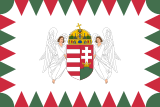رئيس المجر
رئيس المجر "(مجرية: Magyarország elnöke أو" államelnök "أو" államfő ") هو رئيس الدولة لـ المجر . للمكتب دور احتفالي إلى حد كبير (شخصية) ، ولكن يجوز له أيضًا تشريعات النقض أو إرسال تشريع إلى المحكمة الدستورية لمراجعته. تناط معظم السلطات التنفيذية الأخرى ، مثل اختيار وزراء الحكومة والمبادرات التشريعية القيادية ، بمكتب رئيس الوزراء بدلاً من ذلك.
| رئيس المجر
Magyarország elnöke | |
|---|---|
 | |
| المقر | Sándor Palace بوداپشت, المجر |
| المعيـِّن | الجمعية الوطنية |
| طول المدة | خمس سنوات قابلة للتجديد مرة واحدة |
| الشاغل الافتتاحي | Mátyás Szűrös |
| التشكل | 23 أكتوبر 1989 |
| الراتب | HUF 21,553,383 سنويا [1] |
| الموقع الإلكتروني | The Office of the President of Hungary: keh.hu (in Hungarian; at October 2012, home page offered link to English module) |
الرئيس الحالي للجمهورية هو يانوش أدير ، الذي تولى منصبه في 10 مايو 2012.
. . . . . . . . . . . . . . . . . . . . . . . . . . . . . . . . . . . . . . . . . . . . . . . . . . . . . . . . . . . . . . . . . . . . . . . . . . . . . . . . . . . . . . . . . . . . . . . . . . . . . . . . . . . . . . . . . . . . . . . . . . . . . . . . . . . . . . . . . . . . . . . . . . . . . . . . . . . . . . . . . . . . . . . .
الانتخابات الرئاسية
The Constitution of Hungary provides that the National Assembly (Országgyűlés) elects the President of Hungary for a term of five years. Presidents have a term limit of two terms of office.[2]
استقلالية الوظيفة
According to Article 12 (2) of the Constitution, the President, when exercising their function, can not exercise "a public, political, economic or social function or mission". They may not engage in "any other paid professional activity, and may not receive remuneration for any other activity, other than activities subject to copyright.[2]
شرط الترشيح
According to Article 10 (2), any Hungarian citizen aged at least 35 years may be elected president.[2]
العملية الانتخابية
Called by the President of the National Assembly, the presidential election must be held between 30 and 60 days before the end of the term of the incumbent president, or within 30 days if the office is vacated.[3]
The Constitution states that candidatures must be "proposed in writing by at least one fifth of the members of the National Assembly".[4] They shall be submitted to the President of the National Assembly before the vote. A member of the National Assembly may nominate only one candidate.[4]
The secret ballot must be completed within 2 consecutive days at the most. In the first round, if one of the candidates obtains more than 2/3 of the votes of all the members of the National Assembly, the candidate is elected.[5]
If no candidate obtains the required majority, the second round is organized between the two candidates who obtained the most votes in the first round. The candidate obtaining the majority of the votes cast in the second round shall be elected president. If the second round is unsuccessful, a new election must be held after new candidatures are submitted.[6]
يمين المنصب
According to Article 11 (6), the President of Hungary must take an oath before the National Assembly.[2]
The oath is as follows:
| ” | Én, [name of the person] fogadom, hogy Magyarországhoz és annak Alaptörvényéhez hű leszek, jogszabályait megtartom és másokkal is megtartatom; [name of the function] tisztségemet a magyar nemzet javára gyakorolom. [And, according to the conviction of the one who takes the oath] Isten engem úgy segéljen! | “ |
| ” | I [name of the person], swear to be faithful to Hungary and its Basic Law, to respect and enforce its legislation by others; I shall exercise my function as the [name of the function] for the good of the Hungarian nation. [And, according to the conviction of the one who takes the oath] May God help me! | “ |
الكفاءات والامتيازات
According to the Basic Law, "the Head of State of Hungary is the President of the Republic who expresses the unity of the nation and oversees the democratic functioning of State institutions". Commander-in-Chief of the Hungarian Defence Force, he "represents Hungary", "may participate in the sittings of the National Assembly and take the floor", "initiate laws" or a national referendum. It determines the date of elections, participates in "decisions concerning particular states of law" (state of war, emergency, emergency...), convokes the National Assembly after the elections, can dissolve it, check the conformity of a law by the Constitutional Court.[2]
The head of state "proposes the names of the Prime Minister, the President of the Curia, the Principal Public Prosecutor and the Commissioner of Fundamental Rights", the sole nominator of judges and the President of the Budget Council. With the "countersignature of a member of the government", the head of state appoints the ministers, the president of the National Bank, the heads of independent regulatory entities, university professors, generals, mandate ambassadors and university rectors, "awards decorations, rewards and titles". But the President can refuse to make these appointments "if the statutory conditions are not fulfilled or if it concludes for a well-founded reason that there would be a serious disturbance to the democratic functioning of the State institutions".[2]
Also with the agreement of the government, the head of state "exercises the right of individual pardon", "decides matters of organization of territory" and "cases concerning the acquisition and deprivation of citizenship".[2]
الحصانة والعزل من المنصب
According to Article 12 of the Basic Law, "the President of the Republic is inviolable". Consequently, all criminal proceedings against the President can only take place after the end of their mandate.[7]
However, Article 13 (2) of the Constitution provides for the removal of the President. This can only take place if the President "intentionally violates the Basic Law or another law in the performance of duties, or if they commit an offense voluntarily". In such a case, the motion for removal should be proposed by at least 1/5 of the members of the National Assembly.[2]
The indictment procedure is initiated by a decision taken by secret ballot by a majority of 2/3 of the members of the National Assembly.[8] Subsequently, in proceedings before the Constitutional Court, it is determined whether the President should be relieved of their duties.[9]
If the Court establishes the responsibility of the President, the President shall be removed from office.[10]
الخلافة
إنهاء التفويض والعجز
According to Article 12 (3), the term of office of the President of the Republic ends:
- When the term of office is completed;
- By the death of the President while in office;
- By an incapacity which renders impossible the performance of their duties for more than 90 days;
- If they no longer meet the conditions for being eligible;
- A declaration of incompatibility of duties;
- By resignation;
- By dismissal.
According to Article 12 (4), the National Assembly must decide by a majority of 2/3 of all its members to decide the incapacity of the President of the Republic to exercise their responsibilities for more than 90 days.
الغياب (عجز مؤقت)
According to Article 14 (1), if the President of Hungary is temporarily incapable of exercising their functions and powers, these are exercised by the President of the National Assembly (who can not delegate them to deputies and who is replaced in National Assembly duties by the Vice-President of the National Assembly[11] until the end of the President's incapacity.
According to Article 14 (2), the temporary incapacity of the President of Hungary is decided by the National Assembly on the proposal of the President himself, the Government, or a member of the National Assembly.[2]
التاريخ
. . . . . . . . . . . . . . . . . . . . . . . . . . . . . . . . . . . . . . . . . . . . . . . . . . . . . . . . . . . . . . . . . . . . . . . . . . . . . . . . . . . . . . . . . . . . . . . . . . . . . . . . . . . . . . . . . . . . . . . . . . . . . . . . . . . . . . . . . . . . . . . . . . . . . . . . . . . . . . . . . . . . . . . .
الدور في التشريع
| The role of the President of Hungary in the legislative process[12] | ||||
|---|---|---|---|---|
| President | Self-proposed laws | Political vetoes | Constitutional vetoes | All |
| Árpád Göncz (1990–1995) |
3 | 0 | 7 | 10 |
| Árpád Göncz (1995–2000) |
0 | 2 | 1 | 3 |
| Ferenc Mádl (2000–2005) |
0 | 6 | 13 | 19 |
| László Sólyom (2005–2010) |
0 | 31 | 16 | 47 |
| Pál Schmitt (2010–2012) |
0 | 0 | 0 | 0 |
| János Áder (2012–2017) |
0 | 28 | 5 | 33 |
| János Áder (2017–present) |
0 | 6 | 1 | 7 |
| All | 3 | 73 | 43 | 119 |
الرؤساء السابقون الأحياء
There are three living former Hungarian presidents:
Mátyás Szűrös
(1989–1990)
11 سبتمبر 1933László Sólyom
(2005–2010)
3 يناير 1942Pál Schmitt
(2010–2012)
13 مايو 1942
أحدث الانتخابات
| Candidate | Party | Supporting parties | 1st round | 2nd round | |||||
|---|---|---|---|---|---|---|---|---|---|
| Votes | % of all MPs |
% of voting MPs |
Votes | % of all MPs |
% of voting MPs | ||||
| János Áder | Fidesz | Fidesz–KDNP | 131 | 65.8 | 74.9 | 131 | 65.8 | 77.1 | |
| László Majtényi | Independent | MSZP–LMP–DK–Együtt–PM–MLP | 44 | 22.1 | 25.1 | 39 | 19.6 | 22.9 | |
| Total votes | 175 | 87.9 | 170 | 85.4 | |||||
| Did not vote | 24 | 12.1 | 29 | 14.6 | |||||
| Total seats | 199 | 100 | 199 | 100 | |||||
| Source: hvg.hu | |||||||||
أنظر أيضاً
المصادر
- ^ "IG.com Pay Check". IG.
- ^ أ ب ت ث ج ح خ د ذ THE BASIC (FUNDAMENTAL) LAW OF HUNGARY A Commentary of the New Hungarian Constitution (Clarus Press, 2015, ISBN 978-1-905536-81-8), pp. 153–163
- ^ Article 11 (1) of the Constitution
- ^ أ ب Article 11 (2) of the Constitution
- ^ Article 11 (3) of the Constitution
- ^ Article 11 (4) of the Constitution
- ^ Article 13 (1) of the Constitution
- ^ Article 13 (3) of the Constitution
- ^ Article 13 (4) of the Constitution
- ^ Article 13 (6) of the Constitution
- ^ Article 14 (3) of the Constitution
- ^ "A köztársasági elnök szerepe a törvényalkotásban". Országgyűlés.
